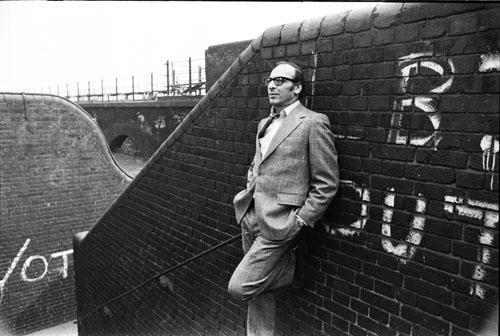Emanuel Litvinoff, 1915-2011
The Guardian and The Telegraph both report that poet and novelist Emanuel Litvinoff passed away on September 24. Litvinoff, born in 1915 in Whitechapel, East London, might be best remembered for a "devastating public attack" on TS Eliot. The Telegraph describes the moment:
During the 1920s, at a time of high literary anti-Semitism, Eliot had written several strongly anti-Semitic poems, including "Burbank with a Baedeker: Bleistein with a Cigar," in which “Burbank” is described as a “Chicago Semite Viennese” whose “lustreless protrusive eye, stares from the protozoic slime”. The poem continues: “On the Rialto once./The rats are underneath the piles/The Jew is underneath the lot./Money in furs.” Eliot included the poem in his 1948 Selected Poems, published by Penguin as a first popular edition of his works.
Litvinoff admired Eliot and was inclined to forgive him for his fashionable pre-war anti-Semitism, but was horrified that he was prepared to celebrate such sentiments after the Holocaust. In 1952 Litvinoff wrote a poem entitled "To TS Eliot" in which he angrily proclaimed: “I share the protozoic slime of Shylock”. He was scheduled to read it at the inaugural poetry reading of the Institute of Contemporary Arts; then, just before the start of the event, the ICA’s chairman Sir Herbert Read, thinking that the poem was meant as a tribute to Eliot, informed him that “Tom” had just arrived with an entourage.
Nervous but undaunted, Litvinoff launched into his poem, which at first produced a shocked silence, and then pandemonium. Stephen Spender rose indignantly to declare: “As a poet as Jewish as Litvinoff, I deeply resent this slanderous attack on a great poet and a good friend.”
Herbert Read expressed himself scandalised by Litvinoff’s “bad form” and told him that if he had known in advance what the poem was about, he would not have allowed it to be read. Amid the general denunciation, only one member of the audience seemed to have a good word for Litvinoff: Eliot was overheard to mutter to his friends: “It’s a good poem.” Of all the poems which Litvinoff wrote, "To TS Eliot" was the one which appeared time and time again in anthologies.
It wasn't all Litvinoff was known for, but the moment was exemplary. Writes The Guardian:
From that moment, through to Emanuel's major poems, such as "The Dead Sea" (from his 1973 collection Notes for a Survivor), several novels and his memoir, Journey Through a Small Planet (1972), Emanuel's voice was one raised in protest against the fate of the Jews. His editorship of the monthly newsletter Jews in Eastern Europe, which gave details of the atrocities being perpetuated against the Jews of the Soviet Union, made a serious contribution to the legislation that eventually allowed Jewish people to leave the USSR for Israel.
Livitnoff was on active duty from 1939 until the end of World War I, and wrote his first and second collections while posted in Northern Ireland, North Yorkshire, and, in 1942, Sierra Leone.
He ended the war, after further service in Alexandria, as acting major, and returned to the immediate postwar depression of a damp basement in Fitzjohn's Avenue, Hampstead, where he struggled to make a living as a writer. He worked with the novelist Louis Golding on a play based on Golding's bestseller, Magnolia Street – a spectacular flop at the Embassy theatre, in Swiss Cottage. He also worked as a reviewer and commentator for publications including the Guardian, the Listener and the New Statesman. His son, Julian, was born in 1946, by which time [his wife] Irene had become the breadwinner thanks to her modelling career under the name of Cherry Marshall....
Let's break here to note that, according to the British model's own obituary, her real name was "Irene Maud Pearson, but she borrowed a surname from the postwar Marshall Plan when she needed a moniker balanced between competence and feminine pertness."
In 1955 [Livitnoff] masterminded an unlikely fashion show to the USSR for his wife and the glamorous models of her Cherry Marshall Agency, and in doing so he "walked 50 yards into the Jewish problem". The experience of seeing derelict elderly Jews who had been in Soviet prison camps galvanised him into making the plight of Soviet Jews internationally known. Gradually he became a world expert on the subject, recruiting Bertrand Russell, among others, to the cause, and visiting cities in Europe and the US to lecture and drum up support.
Livinoff went on to write films as well, one of which was to star Dirk Bogarde but was never made (darn it!), and several TV plays. Watch Livinoff read his famous "To TS Eliot" for a BBC documentary on Eliot below. (An explanation of Eliot's anti-semitism precedes the reading.)



